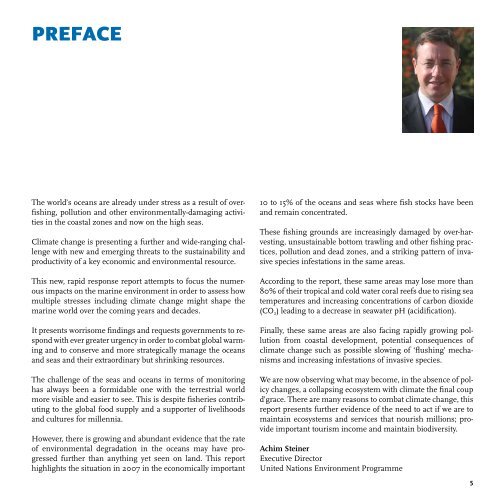In Dead Water: Merging of climate change with - UNEP
In Dead Water: Merging of climate change with - UNEP
In Dead Water: Merging of climate change with - UNEP
Create successful ePaper yourself
Turn your PDF publications into a flip-book with our unique Google optimized e-Paper software.
PREFACE<br />
The world’s oceans are already under stress as a result <strong>of</strong> overfishing,<br />
pollution and other environmentally-damaging activities<br />
in the coastal zones and now on the high seas.<br />
Climate <strong>change</strong> is presenting a further and wide-ranging challenge<br />
<strong>with</strong> new and emerging threats to the sustainability and<br />
productivity <strong>of</strong> a key economic and environmental resource.<br />
This new, rapid response report attempts to focus the numerous<br />
impacts on the marine environment in order to assess how<br />
multiple stresses including <strong>climate</strong> <strong>change</strong> might shape the<br />
marine world over the coming years and decades.<br />
It presents worrisome findings and requests governments to respond<br />
<strong>with</strong> ever greater urgency in order to combat global warming<br />
and to conserve and more strategically manage the oceans<br />
and seas and their extraordinary but shrinking resources.<br />
The challenge <strong>of</strong> the seas and oceans in terms <strong>of</strong> monitoring<br />
has always been a formidable one <strong>with</strong> the terrestrial world<br />
more visible and easier to see. This is despite fisheries contributing<br />
to the global food supply and a supporter <strong>of</strong> livelihoods<br />
and cultures for millennia.<br />
However, there is growing and abundant evidence that the rate<br />
<strong>of</strong> environmental degradation in the oceans may have progressed<br />
further than anything yet seen on land. This report<br />
highlights the situation in 2007 in the economically important<br />
10 to 15% <strong>of</strong> the oceans and seas where fish stocks have been<br />
and remain concentrated.<br />
These fishing grounds are increasingly damaged by over-harvesting,<br />
unsustainable bottom trawling and other fishing practices,<br />
pollution and dead zones, and a striking pattern <strong>of</strong> invasive<br />
species infestations in the same areas.<br />
According to the report, these same areas may lose more than<br />
80% <strong>of</strong> their tropical and cold water coral reefs due to rising sea<br />
temperatures and increasing concentrations <strong>of</strong> carbon dioxide<br />
(CO2) leading to a decrease in seawater pH (acidification).<br />
Finally, these same areas are also facing rapidly growing pollution<br />
from coastal development, potential consequences <strong>of</strong><br />
<strong>climate</strong> <strong>change</strong> such as possible slowing <strong>of</strong> ‘flushing’ mechanisms<br />
and increasing infestations <strong>of</strong> invasive species.<br />
We are now observing what may become, in the absence <strong>of</strong> policy<br />
<strong>change</strong>s, a collapsing ecosystem <strong>with</strong> <strong>climate</strong> the final coup<br />
d’grace. There are many reasons to combat <strong>climate</strong> <strong>change</strong>, this<br />
report presents further evidence <strong>of</strong> the need to act if we are to<br />
maintain ecosystems and services that nourish millions; provide<br />
important tourism income and maintain biodiversity.<br />
Achim Steiner<br />
Executive Director<br />
United Nations Environment Programme

















